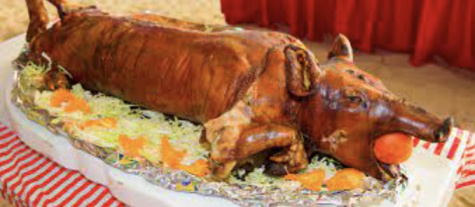Being a Filipino-American (AAPI)

October 21, 2022
Growing up in a Filipino household in America clashed with my native Filipino culture and the American culture I grew up in. Experiencing both of the diverse ways of living in different nations, I noticed a contrast in traditions and values. Just to give one example, as a Filipino, I was taught that family is everything and everything we do is for family; nothing can replace blood relations. However, as an American, friends can become family and can be as valuable as one’s own kin.
Unlike my parents, who grew up in the Philippines, my first language was, of course, English. Living in America, there really was no need for me to learn Tagalog or Bisaya, (2 of the many dialects in the Philippines), and my parents didn’t want to confuse me with speaking in three different languages while growing up. They made sure to only speak English to me, but when speaking to each other, they would mostly speak in Bisaya. This way, even though I would hear what they were saying, I never had the chance to really practice our native language.
My incapability to understand my own language made me feel a lack of connection with fellow Filipinos. I would often hear a Filipino joke and wonder what was so funny about it. I would be on facetime calls with family members who live in the Philippines, and would always have to look at my mom to translate what they said and ask how to reply in Bisaya. I would be around my Filipino friends who understand more than me and would need to ask them to translate what the adults said for me.
Although I do understand some words and phrases, I am still learning how to understand my native language and practice my native tongue. However, I feel a growing distance every time I am reminded of my inability to speak my language. This doesn’t necessarily mean that I have completely lost touch with my Filipino culture; I just am not completely connected with certain aspects of it.
Nevertheless, these are practices and traditions that my parents have carried over from the Philippines and passed down to me. For example, Filipino superstitions, the Christmas spirit, and traditional Filipino food have always been a part of my life, and are cultural interrelations I am glad I can connect to with other Filipinos.
Whenever it was someone’s birthday, we always had to make sure to eat long noodles like spaghetti or pancit to ensure a long life. We would start decorating and celebrating Christmas during the ‘ber’ months, like Septem’ber’, Octo’ber’, Novem’ber’, and Decem’ber’. This practice would reflect the amount of spirit found in the Philippines during Christmas time. My parents and uncle also cooked homemade adobo, champorado, pancit, and lechon. We can’t forget about karaoke nights either!

Despite the lack of connection I sometimes feel with my Filipino culture, I’m still grateful for the traditions that I was able to be a part of and continue. I’m glad that my parents did not completely omit the Filipino heritage aspect from my life, and that I can use my experience to connect with other Filipino Americans.


